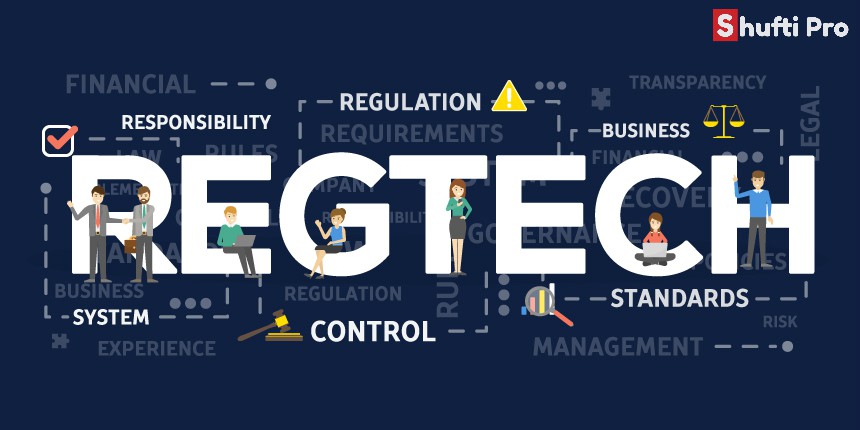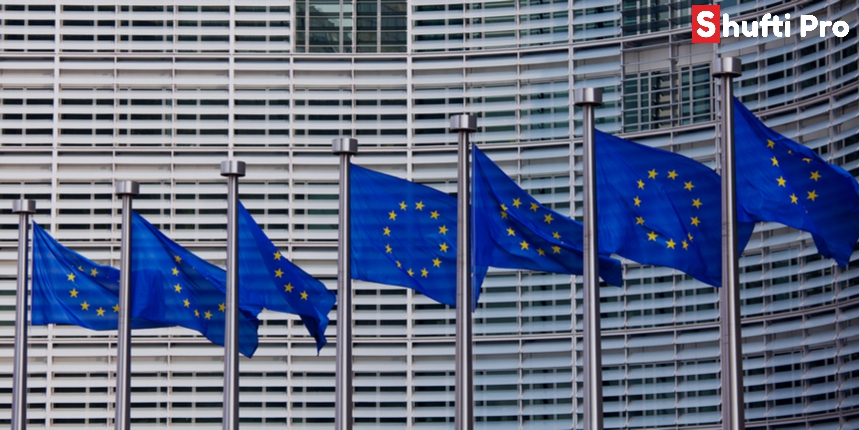Anti Money Laundering, Blog, Financial Crime / AML, Reg Tech
EU’s Sixth Anti-Money Laundering Directive (AMLD6)
Summary: Sixth Anti-Money Laundering Directive (AMLD6) highlights a stringent framework to combat...
 Explore More
Explore More
Anti Money Laundering, Blog, Financial Crime / AML, Reg Tech
EU’s Sixth Anti-Money Laundering Directive (AMLD6)
Summary: Sixth Anti-Money Laundering Directive (AMLD6) highlights a stringent framework to combat...
 Explore More
Explore More
Anti Money Laundering, Blog, Financial Crime / AML
Mastercard’s EFM Compliance – Another Reason to Invest in Verification
The modern world is an era of technology. Moving into the fourth industrial revolution, digitizat...
 Explore More
Explore More
Anti Money Laundering, Artificial Intelligence, Blog
AI a Blessing – AML compliance cost reduced by $217 billion
The U.S. financial firms spend approximately $25.3 Billion in terms of compliance, risk managemen...
 Explore More
Explore More
Anti Money Laundering, Blog, Reg Tech
RegTech facilitates effortless AML Compliance
The latest report by Research and Markets states that RegTech industry is expected to grow...
 Explore More
Explore More
Anti Money Laundering, Blog, Business Technology, Financial Crime / AML, Identity & KYC
Global Economies are joining forces with FATF against money laundering
Financial Action Task Force (FATF) has been very keen on eliminating financial crime (money laund...
 Explore More
Explore More
Anti Money Laundering, Blog, Financial Crime / AML
Why PEPs are High Risk and a Threat To Your Business?
In the Financial and Trade industry, you may have often heard the term PEPs and the importance of...
 Explore More
Explore More
Anti Money Laundering, Blog, Business Technology, Identity & KYC
Customer Due Diligence: From KYC to KYB
Why CDD is significant for both Know Your Customer and Know your Business verification?
Banking i...
 Explore More
Explore More
Anti Money Laundering, Blog, Business Technology, Financial Crime / AML, Identity & KYC
AML Compliance in EU Member States and Risks of Businesses
Making regulations is just the first step, the true game starts when it comes to implementation, ...
 Explore More
Explore More
Anti Money Laundering, Artificial Intelligence, Blog
AI a Blessing – AML compliance cost reduced by $217 billion
The U.S. financial firms spend approximately $25.3 Billion in terms of compliance, risk managemen...
 Explore More
Explore More
Anti Money Laundering, Blog, Financial Crime / AML, Reg Tech
EU’s Sixth Anti-Money Laundering Directive (AMLD6)
Summary: Sixth Anti-Money Laundering Directive (AMLD6) highlights a stringent framework to combat...
 Explore More
Explore More
Anti Money Laundering, Blog
How is Libra’s Launch Changing the Cryptocurrency Landscape?
Libra will have to go the extra mile to prove itself worthy of global acclaim that it aims to ach...
 Explore More
Explore More
Anti Money Laundering, Blog, Business Technology, Financial Crime / AML, Identity & KYC
AML Compliance in EU Member States and Risks of Businesses
Making regulations is just the first step, the true game starts when it comes to implementation, ...
 Explore More
Explore More
Anti Money Laundering, Blog, Business Technology, Financial Crime / AML, Fraud Prevention, Identity & KYC
Initial CCPA Compliance Costs Could Hit $55 Billion: Report
According to an economic impact assessment prepared for the state attorney general’s office by an...
 Explore More
Explore More
Anti Money Laundering, Blog, Identity & KYC, Reg Tech
RegTech – FATF Guidance for Digital Identity Verification
Regulatory authorities have recognized the benefits of technology and its use for seamless regula...
 Explore More
Explore More
Anti Money Laundering, Blog, Business Technology, Financial Crime / AML, Fraud Prevention, Identity & KYC
Initial CCPA Compliance Costs Could Hit $55 Billion: Report
According to an economic impact assessment prepared for the state attorney general’s office by an...
 Explore More
Explore More
Anti Money Laundering, Blog, Financial Crime / AML
US Treasury opposes European Commission AML Country List
The European Commission has adopted a new list of 23 countries which lack appropriate framework f...
 Explore More
Explore More
Anti Money Laundering, Blog, Business Technology, Identity & KYC
Customer Due Diligence: From KYC to KYB
Why CDD is significant for both Know Your Customer and Know your Business verification?
Banking i...
 Explore More
Explore More
Anti Money Laundering, Blog, Business Technology, Financial Crime / AML, Identity & KYC
Global Economies are joining forces with FATF against money laundering
Financial Action Task Force (FATF) has been very keen on eliminating financial crime (money laund...
 Explore More
Explore More
Anti Money Laundering, Blog
How is Libra’s Launch Changing the Cryptocurrency Landscape?
Libra will have to go the extra mile to prove itself worthy of global acclaim that it aims to ach...
 Explore More
Explore More
Anti Money Laundering, Artificial Intelligence, Blog
AI a Blessing – AML compliance cost reduced by $217 billion
The U.S. financial firms spend approximately $25.3 Billion in terms of compliance, risk managemen...
 Explore More
Explore More
Anti Money Laundering, Blog, Business Technology, Financial Crime / AML, Identity & KYC
AML Compliance in EU Member States and Risks of Businesses
Making regulations is just the first step, the true game starts when it comes to implementation, ...
 Explore More
Explore More
Anti Money Laundering, Blog, Business Technology, Financial Crime / AML, Identity & KYC
Global Economies are joining forces with FATF against money laundering
Financial Action Task Force (FATF) has been very keen on eliminating financial crime (money laund...
 Explore More
Explore More
Anti Money Laundering, Blog
Danske Bank Scandal: Banks Under Strict AML Scrutiny of FSA
Money laundering is becoming a global phenomenon. As per the United Nations Office on Drug and cr...
 Explore More
Explore More
Anti Money Laundering, Blog, Financial Crime / AML
Mastercard’s EFM Compliance – Another Reason to Invest in Verification
The modern world is an era of technology. Moving into the fourth industrial revolution, digitizat...
 Explore More
Explore More
Anti Money Laundering, Blog, Financial Crime / AML
US Treasury opposes European Commission AML Country List
The European Commission has adopted a new list of 23 countries which lack appropriate framework f...
 Explore More
Explore More
Anti Money Laundering, Blog, Identity & KYC, Reg Tech
RegTech – FATF Guidance for Digital Identity Verification
Regulatory authorities have recognized the benefits of technology and its use for seamless regula...
 Explore More
Explore More
Anti Money Laundering, Blog, Financial Crime / AML, Identity & KYC
Know Your Business-Pillar of Strength To AML Regulations
Moving in the world of technology, where every industry is going digital, there has been very les...
 Explore More
Explore More
Anti Money Laundering, Blog
Danske Bank Scandal: Banks Under Strict AML Scrutiny of FSA
Money laundering is becoming a global phenomenon. As per the United Nations Office on Drug and cr...
 Explore More
Explore More
Anti Money Laundering, Blog, Financial Crime / AML
US Treasury opposes European Commission AML Country List
The European Commission has adopted a new list of 23 countries which lack appropriate framework f...
 Explore More
Explore More
Anti Money Laundering, Blog, Financial Crime / AML, Identity & KYC
Winter is Coming: With a Storm of KYC and AML Regulations
The ever-evolving regulations are creating challenges and complexities for the financial institut...
 Explore More
Explore More
Anti Money Laundering, Blog, Financial Crime / AML
Mastercard’s EFM Compliance – Another Reason to Invest in Verification
The modern world is an era of technology. Moving into the fourth industrial revolution, digitizat...
 Explore More
Explore More
Anti Money Laundering, Blog
How is Libra’s Launch Changing the Cryptocurrency Landscape?
Libra will have to go the extra mile to prove itself worthy of global acclaim that it aims to ach...
 Explore More
Explore More
Anti Money Laundering, Blog, Reg Tech
RegTech facilitates effortless AML Compliance
The latest report by Research and Markets states that RegTech industry is expected to grow...
 Explore More
Explore More
Anti Money Laundering, Artificial Intelligence, Blog
AI a Blessing – AML compliance cost reduced by $217 billion
The U.S. financial firms spend approximately $25.3 Billion in terms of compliance, risk managemen...
 Explore More
Explore More
Anti Money Laundering, Blog, Financial Crime / AML
Why PEPs are High Risk and a Threat To Your Business?
In the Financial and Trade industry, you may have often heard the term PEPs and the importance of...
 Explore More
Explore More
Anti Money Laundering, Blog, Financial Crime / AML, Identity & KYC
Winter is Coming: With a Storm of KYC and AML Regulations
The ever-evolving regulations are creating challenges and complexities for the financial institut...
 Explore More
Explore More
Anti Money Laundering, Blog, Business Technology, Financial Crime / AML, Fraud Prevention, Identity & KYC
Initial CCPA Compliance Costs Could Hit $55 Billion: Report
According to an economic impact assessment prepared for the state attorney general’s office by an...
 Explore More
Explore More
Anti Money Laundering, Artificial Intelligence, Blog
AI a Blessing – AML compliance cost reduced by $217 billion
The U.S. financial firms spend approximately $25.3 Billion in terms of compliance, risk managemen...
 Explore More
Explore More
Anti Money Laundering, Blog, Reg Tech
RegTech facilitates effortless AML Compliance
The latest report by Research and Markets states that RegTech industry is expected to grow...
 Explore More
Explore More
Anti Money Laundering, Blog, Financial Crime / AML, Identity & KYC
Know Your Business-Pillar of Strength To AML Regulations
Moving in the world of technology, where every industry is going digital, there has been very les...
 Explore More
Explore More
Anti Money Laundering, Blog, Business Technology, Financial Crime / AML, Identity & KYC
Global Economies are joining forces with FATF against money laundering
Financial Action Task Force (FATF) has been very keen on eliminating financial crime (money laund...
 Explore More
Explore More
Anti Money Laundering, Blog, Business Technology, Financial Crime / AML, Identity & KYC
AML Compliance in EU Member States and Risks of Businesses
Making regulations is just the first step, the true game starts when it comes to implementation, ...
 Explore More
Explore More
Anti Money Laundering, Blog, Financial Crime / AML
Why PEPs are High Risk and a Threat To Your Business?
In the Financial and Trade industry, you may have often heard the term PEPs and the importance of...
 Explore More
Explore More
Anti Money Laundering, Blog, Financial Crime / AML, Identity & KYC
Winter is Coming: With a Storm of KYC and AML Regulations
The ever-evolving regulations are creating challenges and complexities for the financial institut...
 Explore More
Explore More
Anti Money Laundering, Blog, Financial Crime / AML
Mastercard’s EFM Compliance – Another Reason to Invest in Verification
The modern world is an era of technology. Moving into the fourth industrial revolution, digitizat...
 Explore More
Explore More
Anti Money Laundering, Blog, Financial Crime / AML, Reg Tech
EU’s Sixth Anti-Money Laundering Directive (AMLD6)
Summary: Sixth Anti-Money Laundering Directive (AMLD6) highlights a stringent framework to combat...
 Explore More
Explore More
Anti Money Laundering, Blog, Financial Crime / AML, Identity & KYC
Know Your Business-Pillar of Strength To AML Regulations
Moving in the world of technology, where every industry is going digital, there has been very les...
 Explore More
Explore More
Anti Money Laundering, Blog, Financial Crime / AML, Identity & KYC
Winter is Coming: With a Storm of KYC and AML Regulations
The ever-evolving regulations are creating challenges and complexities for the financial institut...
 Explore More
Explore More
Anti Money Laundering, Blog, Reg Tech
RegTech facilitates effortless AML Compliance
The latest report by Research and Markets states that RegTech industry is expected to grow...
 Explore More
Explore More
Anti Money Laundering, Blog, Identity & KYC, Reg Tech
RegTech – FATF Guidance for Digital Identity Verification
Regulatory authorities have recognized the benefits of technology and its use for seamless regula...
 Explore More
Explore More
Anti Money Laundering, Blog, Identity & KYC, Reg Tech
RegTech – FATF Guidance for Digital Identity Verification
Regulatory authorities have recognized the benefits of technology and its use for seamless regula...
 Explore More
Explore More
Anti Money Laundering, Blog, Financial Crime / AML
US Treasury opposes European Commission AML Country List
The European Commission has adopted a new list of 23 countries which lack appropriate framework f...
 Explore More
Explore More
Anti Money Laundering, Blog, Reg Tech
RegTech facilitates effortless AML Compliance
The latest report by Research and Markets states that RegTech industry is expected to grow...
 Explore More
Explore More
Anti Money Laundering, Blog, Financial Crime / AML, Reg Tech
EU’s Sixth Anti-Money Laundering Directive (AMLD6)
Summary: Sixth Anti-Money Laundering Directive (AMLD6) highlights a stringent framework to combat...
 Explore More
Explore More
Anti Money Laundering, Blog, Business Technology, Financial Crime / AML, Identity & KYC
AML Compliance in EU Member States and Risks of Businesses
Making regulations is just the first step, the true game starts when it comes to implementation, ...
 Explore More
Explore More
Anti Money Laundering, Blog, Business Technology, Identity & KYC
Customer Due Diligence: From KYC to KYB
Why CDD is significant for both Know Your Customer and Know your Business verification?
Banking i...
 Explore More
Explore More
Anti Money Laundering, Blog, Financial Crime / AML, Reg Tech
EU’s Sixth Anti-Money Laundering Directive (AMLD6)
Summary: Sixth Anti-Money Laundering Directive (AMLD6) highlights a stringent framework to combat...
 Explore More
Explore More
Anti Money Laundering, Blog, Financial Crime / AML, Identity & KYC
Winter is Coming: With a Storm of KYC and AML Regulations
The ever-evolving regulations are creating challenges and complexities for the financial institut...
 Explore More
Explore More
Anti Money Laundering, Artificial Intelligence, Blog
AI a Blessing – AML compliance cost reduced by $217 billion
The U.S. financial firms spend approximately $25.3 Billion in terms of compliance, risk managemen...
 Explore More
Explore More
Anti Money Laundering, Blog, Financial Crime / AML, Identity & KYC
Know Your Business-Pillar of Strength To AML Regulations
Moving in the world of technology, where every industry is going digital, there has been very les...
 Explore More
Explore More
Anti Money Laundering, Blog, Financial Crime / AML
Why PEPs are High Risk and a Threat To Your Business?
In the Financial and Trade industry, you may have often heard the term PEPs and the importance of...
 Explore More
Explore More
Anti Money Laundering, Blog, Financial Crime / AML
US Treasury opposes European Commission AML Country List
The European Commission has adopted a new list of 23 countries which lack appropriate framework f...
 Explore More
Explore More
Anti Money Laundering, Blog
How is Libra’s Launch Changing the Cryptocurrency Landscape?
Libra will have to go the extra mile to prove itself worthy of global acclaim that it aims to ach...
 Explore More
Explore More
Anti Money Laundering, Blog, Identity & KYC, Reg Tech
RegTech – FATF Guidance for Digital Identity Verification
Regulatory authorities have recognized the benefits of technology and its use for seamless regula...
 Explore More
Explore More
Anti Money Laundering, Blog, Financial Crime / AML, Identity & KYC
Know Your Business-Pillar of Strength To AML Regulations
Moving in the world of technology, where every industry is going digital, there has been very les...
 Explore More
Explore More
Anti Money Laundering, Blog, Business Technology, Financial Crime / AML, Identity & KYC
AML Compliance in EU Member States and Risks of Businesses
Making regulations is just the first step, the true game starts when it comes to implementation, ...
 Explore More
Explore More
Anti Money Laundering, Blog
Danske Bank Scandal: Banks Under Strict AML Scrutiny of FSA
Money laundering is becoming a global phenomenon. As per the United Nations Office on Drug and cr...
 Explore More
Explore More
Anti Money Laundering, Blog, Financial Crime / AML, Reg Tech
EU’s Sixth Anti-Money Laundering Directive (AMLD6)
Summary: Sixth Anti-Money Laundering Directive (AMLD6) highlights a stringent framework to combat...
 Explore More
Explore More
Anti Money Laundering, Blog, Financial Crime / AML
Mastercard’s EFM Compliance – Another Reason to Invest in Verification
The modern world is an era of technology. Moving into the fourth industrial revolution, digitizat...
 Explore More
Explore More
Anti Money Laundering, Blog, Financial Crime / AML
Why PEPs are High Risk and a Threat To Your Business?
In the Financial and Trade industry, you may have often heard the term PEPs and the importance of...
 Explore More
Explore More
Anti Money Laundering, Artificial Intelligence, Blog
AI a Blessing – AML compliance cost reduced by $217 billion
The U.S. financial firms spend approximately $25.3 Billion in terms of compliance, risk managemen...
 Explore More
Explore More


















